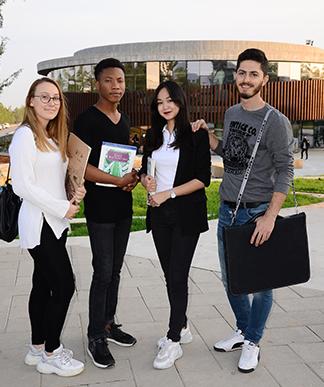Information and Communication Technologies (MSc)



About the Program
Graduates of the Information and Communication Technologies in Education (ICT in Education) Master’s Program (M.Sc.) are trained with the required knowledge and skills to apply current research and learning theories, and use emerging technologies to solve learning problems. It is an interdisciplinary program focusing on the design of learning technology environments, systems, applications and instructional materials for multiple learning contexts.
The focal points of the faculty staff and students include:
Computer-supported collaborative learning
Games and simulations
Instructional design
Performance improvement
Emerging technologies
Online, blended, and mobile learning and teaching
Technology for classroom interaction and engagement
Education Opportunities
Cyprus International University, which hosts students from many countries around the world, offers high-quality education and training opportunity in an international environment. In our department, research and practice are given as much importance as the courses so, our students learn by doing and living. Scientific activities such as conferences, seminars, symposiums and panels are organized on a regular basis to contribute to the development of productive, creative and independent individuals with scientific thinking skills and working styles. Moreover, the students will have strong academic background as well as necessary skills to be competent in the academic world, the industry or the service sector. Postgraduate studies at CIU are built upon academic freedom and ethical conduct. Our practical laboratories, equipped with the most recent technologies, are open to the use of our students outside the class hours. Our students, as individuals living in a globalized world, are trained through teaching methods which provide them with the knowledge and skills on all devices and materials used in education in order to make them aware of the rapid changes in technology and information flow. On top of that, postgraduate students will have multicultural educational opportunities with the expertise of the academic staff.

Career Areas
Students gain the skills needed for careers in K-12 schools, universities, government agencies, businesses, and other organizations.
Graduates have the opportunity to work in the following positions and fields:
Education and Training Technologist
Academic Staff
Content Development Specialist
E-Learning Project Manager
Software Development Specialist
Computer Systems and Web Designer
Multimedia and Graphic Designer
Computer Programmer
Project supervisor
Network Administrator
System Designer
Multimedia Designer
Database Administrator
Contact
Institute of Graduate Studies and Research
Graduate Sciences and Education Center, GE106
Tel: +90 392 671 1111 Extension: 2776
Institute E-mail: ciu-institute@ciu.edu.tr
Compulsory Courses
First Semester
DESIGN AND EVALUATION OF INSTRUCTIONAL MATERIALS
Course code
ICTE501Credit
3Theoretical
3Practical
0Ects
8AREA ELECTIVE
Course code
ICTE5X1Credit
3Theoretical
3Practical
0Ects
8AREA ELECTIVE
Course code
ICTE5X2Credit
3Theoretical
3Practical
0Ects
8RESEARCH METHODS
Course code
SOSC501Credit
3Theoretical
3Practical
0Ects
8Second Semester
THESIS
Course code
ICTE500Credit
0Theoretical
0Practical
0Ects
60INSTRUCTIONAL DESIGN THEORY AND APPLICATION
Course code
ICTE502Credit
3Theoretical
3Practical
0Ects
8SEMINAR
Course code
ICTE590Credit
0Theoretical
0Practical
0Ects
4AREA ELECTIVE
Course code
ICTE5X3Credit
3Theoretical
3Practical
0Ects
8AREA ELECTIVE
Course code
ICTE5X4Credit
3Theoretical
3Practical
0Ects
8Elective Courses
MANAGEMENT OF TECHNOLOGY IN ORGANIZATIONS
Course code
EDAP519Credit
3Theoretical
3Practical
0Ects
EDUCATIONAL TECHNOLOGY
Course code
MISY565Credit
3Theoretical
3Practical
0Ects
DISTANCE EDUCATION
Course code
ICTE507Credit
3Theoretical
3Practical
0Ects
INFORMATION COMMUNICATION TECHNOLOGIES PROJECT MANAGEMENT
Course code
ICTE503Credit
3Theoretical
3Practical
0Ects
QUALITATIVE RESEARCH METHODS
Course code
COMM515Credit
3Theoretical
3Practical
0Ects
THEORY AND PRACTICE IN EDUCATIONAL ADMINISTRATION
Course code
EDAP502Credit
3Theoretical
3Practical
0Ects
LEARNING BASED ON ONLINE COOPERATION
Course code
EDAP518Credit
3Theoretical
3Practical
0Ects
INSTRUCTIONAL LEADERSHIP
Course code
EDAP506Credit
3Theoretical
3Practical
0Ects
E-GOVERNMENT STUDIES
Course code
MISY566Credit
3Theoretical
3Practical
0Ects
0TOTAL QUALITY MANAGEMENT IN EDUCATION
Course code
EDAP514Credit
3Theoretical
3Practical
0Ects
DIFFUSION OF INNOVATIONS AND COMMUNICATION
Course code
COMM628Credit
3Theoretical
3Practical
0Ects
8Students who are interested in pursuing advanced graduate studies leading to a master’s, doctoral degree, or professional doctorate degree for the Fall and Spring semesters every year. Applicants can directly apply online to our graduate programs using the application portal.
TRNC Applicants- Required documents:
- Bachelor’s Degree Diploma
- Bachelor’s Degree transcripts for each completed academic term/year.
- Documents to prove English proficiency for English language departments,
- Scanned copy of passport or identity card.
Click for detailed admission requirements information.
Students who are interested in pursuing advanced graduate studies leading to a master’s, doctoral degree, or professional doctorate degree for the Fall and Spring semesters every year. Applicants can directly apply online to our graduate programs using the application portal.
International Applicants- Required documents;
- Bachelor’s Degree Diploma
- Bachelor’s Degree transcripts for each completed academic term/year.
- Evidence of English Language competence: TOEFL (65 IBT) or IELTS (5.5). Students without these documents will take the CIU English proficiency exam on campus following arrival.
- Scanned copy of international passport/birth certificate
- CV
- Fully completed and signed CIU Rules and Regulations document (which can be downloaded during the online application)
Click for detailed admission requirements information.
Cyprus International University provides academic scholarships for its students as an incentive for success, with most students benefiting from 50%, 75% or 100% scholarships or discounted tuition fees. Click for more information.
Tuition Fees are determined at the beginning of each academic year. Candidate students who are entitled to enroll in CIU can learn their fees in line with the Tuition Fee Calculation system.